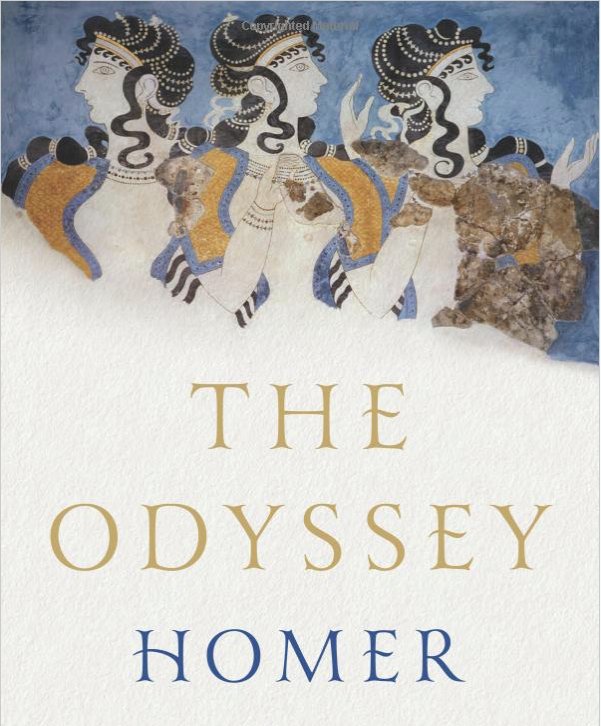The Odyssey by Homer

Rating: 4.4/5
Author: Homer
Paperback: 416 pages
Publisher: Penguin
Publshing Date: 30 January 2003
Language: English
Genre: Poetry
ISBN-10: 9780140449112
ISBN-13: 978-0140449112
ASIN: 0140449116
Cost: Rs. 295 (Paperback), Rs.645 (Hardcover)
Description:
The Odyssey (Penguin Classics) penned by one of the ancient Greek epic poets, Homer is considered as a classic writer in Western literature. The Penguin Classics edition of The Odyssey, as translated by E.V. Rieu and revised by D.C.H, Rieu, comes with an introduction written by Peter Jones. This edition of the epic tale takes readers on a journey of Odysseus back home after a ten-year-long hiatus.
However, Odysseus return to his homeland is not a smooth trip. On the way, he must face many natural and supernatural dangers and confront terrors such as Scylla and Charybdis. He must also brave the enmity of Poseidon, the sea-god himself.
Indeed, this bevy of dangers that Odysseus must combat will test his mettle, bravery and cunningness to the hilt, and it is for the hero to show his true prowess. The twist in the tale comes when Odysseus finds that he must face dangers not only during the journey but also after reaching his homeland.
Review:
The Odyssey is written in dactylic hexameter. It opens in medias res, in the middle of the overall story, with prior events described through flashbacks or storytelling.
The first four books of the poem trace Telemachus' efforts to assert control of the household, and then, at Athena's advice, his efforts to search for news of his long-lost father. Then the scene shifts: Odysseus has been a captive of the beautiful nymph Calypso, with whom he has spent seven of his ten lost years. Released by the intercession of his patroness Athena, through the aid of Hermes, he departs, but his raft is destroyed by his divine enemy Poseidon, who is angry because Odysseus blinded his son, Polyphemus. When Odysseus washes up on Scherie, home to the Phaeacians, he is assisted by the young Nausicaä and is treated hospitably. In return, he satisfies the Phaeacians' curiosity, telling them, and the reader, of all his adventures since departing from Troy. The shipbuilding Phaeacians then loan him a ship to return to Ithaca, where he is aided by the swineherd Eumaeus, meets Telemachus, regains his household by killing the Suitors, and is reunited with his faithful wife, Penelope.
The Odyssey is regarded as one of the most important foundational works of western literature. It is widely regarded by western literary critics as a timeless classic.
Straightforward retellings of the Odyssey have flourished ever since the Middle Ages. Merugud Uilix maicc Leirtis ("On the Wandering of Ulysses, son of Laertes") is an eccentric Old Irish version of the material; the work exists in a 12th-century AD manuscript, which linguists believe is based on an 8th-century original. Il ritorno d'Ulisse in patria, first performed in 1640, is an opera by Claudio Monteverdi based on the second half of Homer's Odyssey.
Odyssey is about cunning, a difference that becomes apparent in the very first lines of the epics. Whereas the Iliad tells the story of the rage of Achilles, the strongest hero in the Greek army, the Odyssey focuses on a “man of twists and turns”
The submission to temptation or recklessness either angers the gods or distracts Odysseus and the members of his crew from their journey: they yield to hunger and slaughter the Sun’s flocks, and they eat the fruit of the lotus and forget about their homes.
The Odyssey shows unambiguously that the gods place their personal pride ahead of justice. The Odyssey is deeply concerned with the moral code binding hosts to treat strangers and travelers kindly. Throughout the poem, Zeus punishes anyone who violates this code.
In the English language as well as many others, the word odyssey has come to refer to an epic voyage. The Odyssey has a lost sequel, the Telegony, which was not attributed to Homer. It was usually attributed in antiquity to Cinaethon of Sparta.
About the author:
Homer, born somewhere around 725 BC in ancient Greece, was a bard who worked in the oral tradition. He is also one of the poets of the ancient times whose works survive till date. Homer's works include the popular Odyssey and Iliad, both of which contain more than 10000 lines. Homer, like his contemporaries had an amazing memory which helped him in remembering and reciting long epic poems such as the ones he wrote.















































